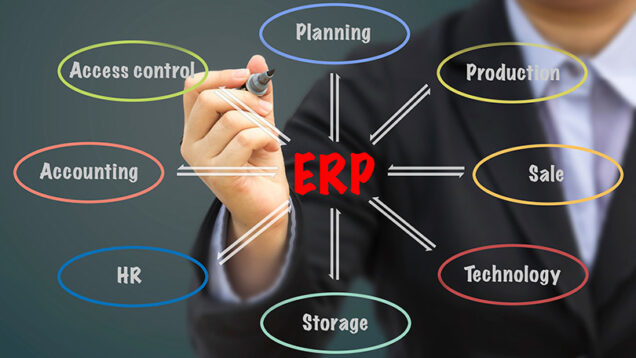
How Do Enterprise Resource Planning Systems Work?
Table of Contents
Do you know what enterprise resource planning systems are? If not, this guide will help.
ERP technology helps companies to manage resources and processes. Companies of all sizes can use it.
ERP helps make it easier to improve operations, productivity, costs, and profitability. Around 90% of companies that implemented ERP felt it was a success.
This guide explains everything you need to know about ERP systems. By the end, you should understand the basics and be able to make a decision on which solution is right for your company.
What Is ERP Software?
ERPs are powerful business management software suites that help companies achieve greater success. ERP functions by streamlining operations, improving productivity, and reducing costs. ERP systems are also used to increase profitability and reduce risk. Today’s businesses must arm themselves with the most effective technology and resources. A modern Cloud ERP system can enhance an organization’s overall performance by bringing together all data into one, easy-to-use location. These new systems will increase your data-driven work environment and provide more accurate reporting. Don’t let outdated software hold you back. Take the time to explore the benefits of cloud ERP today.
An ERP system can be broken down into two categories:
Enterprise Management System
These work at the company level by integrating aspects of your company’s processes. This stretches across departments such as accounting, inventory management, and purchasing.
Manufacturing ERP Systems
These focus on manufacturing businesses like factories or plants. Typically, they offer features for managing production planning, quality control, and maintenance. ERP can provide comprehensive back-office and front-office management. It can automate the process from quote-to-cash and streamline sales fulfillment. It can also integrate with third-party modules and is highly customizable. Today’s manufacturers need to maintain data consistency to make informed decisions and manage their operations efficiently. ERP systems to help them achieve these goals. For example, ERP software helps manufacturers reduce the time it takes to quote and deliver products to customers.
In addition, these types of ERPs often include extra modules. For example, modules for project tracking, warehouse management, and customer relationship management are available.
ERP for Businesses
When looking for ERP software, it’s important to consider all the features. You may not need every capability right now.
Most ERP systems have a modular structure that makes it easy to add new modules when your needs change. Some common ERP system features include:
Financial Management
These capabilities work across finance and accounting departments. They deal with areas such as financial statements, budgets, accounts, and tax reporting.
Manufacturing Operations
Features here can help streamline processes from product design to manufacturing operations. This includes assembly planning and control functions like production scheduling or quality assurance.
Warehouse Management
This feature manages inventory levels by monitoring how much stock is on hand. It also alerts users of on-hand quantities, production, or service status.
Modules can also handle shipment arrival times, delivery schedules, and much more.
Sales Management
ERP systems that offer sales management features help you manage customer relationships. Systems handle the entire process from quote to payment including. This includes orders, invoicing, and billing.
Human Resources Management
ERP systems that offer these capabilities work across payroll, hiring & recruitment. Typical modules include benefits administration and training modules.
Customer Relationship Management (CRM)
These modules help you track customer interactions such as phone calls or emails. All the information related to those interactions is stored on the system.
This includes lead generation, sales follow-up, and communications related to customers.
Choosing Enterprise Resource Planning Systems
It is important to consider system cost and functionality before making a decision. You should also consider how it will interact with existing software and systems.
Whether you choose Oracle, Sage, IFS Software, or SAP, you’ll find that it’s easier once you know what you want.
There are several critical issues that will have an impact on your ERP project. Getting a good idea of these is crucial to success.
How ERPs Help Your Company
ERP systems help companies achieve greater success by streamlining their operations. This improves productivity, reduces costs, and increases profitability. ERPs can do this in several ways depending on the system features you choose:
Accelerating Cycle Times
ERPs integrate all of your company’s processes, so employees don’t have to enter the same data repeatedly. This speeds up time to market, which can help you stay competitive in your industry or niche.
Integration with IoT devices
Using integration with IoT devices in enterprise resource planning (ERP) systems can help manufacturers maximize their operational efficiency. With the help of IoT sensors, manufacturers can track and manage inventory and production data more efficiently. The data collected can be channeled to the requisite systems. ERP systems help manufacturing companies to process this data and provide useful information to drive business strategy and marketing decisions. Ultimately, these systems help companies increase profitability by improving operational efficiency.
Driving Global Business
ERP systems are cross-functional. This means they can handle many different processes across various departments. They can work with many departments depending on the system features you choose.
Get Started With ERP Today
There’s no time like the present to start your ERP journey. Whether you’re a large enterprise or are in the market for small business ERP. There are resources to help you along the way.
If you’ve enjoyed this article, why not check out the rest in our business category?
Also Read: 8 Successful Internet Marketing Strategies to Grow Your Business

